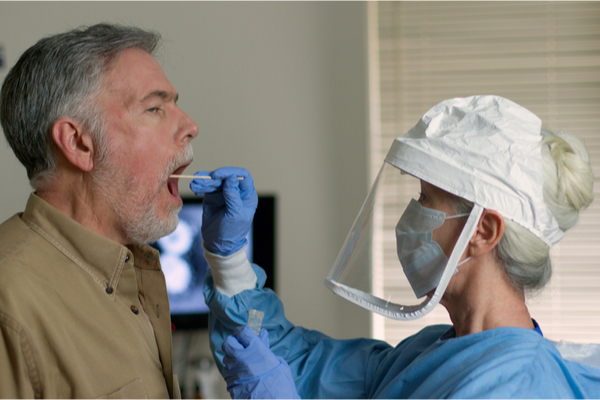Over 20 states aren’t including results from a type of rapid COVID-19 test in their overall case numbers, according to a survey by Kaiser Health News (KHN). The federal government is sending millions of these types of tests all around the country in an effort to keep up with the pandemic. If states don’t release the results from those tests through their public health departments, it creates a blind spot in the overall data.
The tests, called antigen tests, work by detecting a small protein on the surface of the coronavirus. They tend work much faster than the tests that look for the virus itself, called PCR tests, although they can be less accurate.
According to the KHN survey, 21 states and the District of Columbia don’t report all of their antigen test results. Fifteen states and DC don’t count positive antigen test results as confirmed cases, and nearly half of the 48 states that responded to the survey said that their antigen test results are probably underreported.
At the start of the pandemic, the majority of testing done in the United States was PCR testing. Then, the Food and Drug Administration started authorizing antigen tests in May, and over the past few months, others have started to enter the market. Still, it took until August for the Centers for Disease Control and Prevention to say that a patient with a positive antigen test should be considered a probable COVID-19 case, even without checking for symptoms. Even now, the agency’s guidelines say that PCR tests are “confirmatory” evidence of the virus, and antigen tests (because they’re less accurate) are only “presumptive” evidence.
Antigen tests are appealing because they can be run outside of a lab, and could be offered in doctors offices or even in some schools. But that widespread distribution of tests can also make it hard for officials to report the results to a public health agency. One Virginia nursing home director told KHN that, if she started to use antigen tests, she’d have to hand-deliver results to health officials on pieces of paper. Some Indiana antigen test results are sent to health officials by fax.
Despite the data challenges, antigen tests are becoming widely used in key areas. The Department of Health and Human Services has sent millions of antigen tests to nursing homes, which have been devastated by COVID-19, and it plans to send hundreds of millions more. The tests have also been popular with colleges and universities, many of which are battling out-of-control outbreaks. Failing to track the results from those tests could make it seem like cases were stable dropping in an area, even if there was a spike on a college campus.
“The absence of information is a very dangerous thing,” Janet Hamilton, executive director of the Council for State and Territorial Epidemiologists, told KHN. “We will be blind to the pandemic. It will be happening around us and we will have no data.”
—
Photo Credit: JHDT Productions / Shutterstock.com
